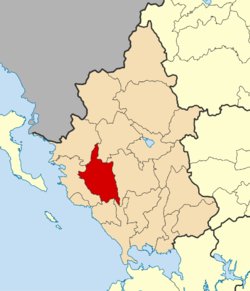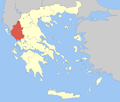Souli
 From Wikipedia - Reading time: 9 min
From Wikipedia - Reading time: 9 min
Souli
Σούλι | |
|---|---|
| Coordinates: 39°22′N 20°38′E / 39.367°N 20.633°E | |
| Country | Greece |
| Administrative region | Epirus |
| Regional unit | Thesprotia |
| Area | |
• Municipality | 502.8 km2 (194.1 sq mi) |
| • Municipal unit | 93.2 km2 (36.0 sq mi) |
| Population (2021)[1] | |
• Municipality | 8,759 |
| • Density | 17/km2 (45/sq mi) |
| • Municipal unit | 349 |
| • Municipal unit density | 3.7/km2 (9.7/sq mi) |
| Time zone | UTC+2 (EET) |
| • Summer (DST) | UTC+3 (EEST) |
Souli (Greek: Σούλι) is a municipality in Epirus, northwestern Greece. The seat of the municipality is the town of Paramythia.[2]
Name and history
[edit]The origin of the name Souli is uncertain. In the earliest historical text about Souli, written by Christoforos Perraivos in 1803, an oral tradition of the locals is recorded. According to this, the first settlers of Souli were shepherds who came from a village called Gardiki trying to avoid the Ottoman oppression. A certain Muslim ("Turk" in the text) named Soulis attempted to expel the early Souliotes from there but the latter resisted with arms. In the battle they killed Soulis and since then the area was named Souli.[3] However, Fourikis (1934) goes as far as proposing that Perraivos invented this explanation himself.[4] The most commonly accepted theory in contemporary historiography, as suggested by Fourikis (1934), states that Souli derives from the Albanian term sul, which means "mountain peak", while it may also be interpreted as "watchpost, lookout, mountain summit".[4]
The municipality owes its name to the villages of Souli that are located in the southern part of this region. Those villages were originally settled by the Souliotes, a warlike Orthodox community who sought refuge in the mountainous terrain from the Ottomans. Those villages in the early 19th century had a population of c. 12,000.[5][6][7] After their expulsion, the population of the region was significantly reduced. In the 18th and 19th century, the citizens of Souli rebelled against the Ottoman rule. It was noted that in 1972 that there was still an Albanian minority in Souli.[8]
Today, many Souliote villages, churches, and fortifications are left partially abandoned due to immigration to other countries, as well as moving to larger towns like Paramythia. Some examples of partly abandoned or sparsely populated villages are Koukoulii (sometimes referred to as Kouklious), Zotiko, and Tsaggario to a lesser extent. The Castle of Kiafia, constructed by Ali Pasha of the Ottoman Empire in order to hide his treasure and money, is completely abandoned and in ruin.
Municipality
[edit]

The present municipality of Souli was formed in the 2011 local government reform by the merger of the following 3 former municipalities, which became municipal units:[2]
- Acherontas
- Paramythia
- Souli
The municipality has an area of 502.8 km2, and the municipal unit 93.2 km2.[9]
Province
[edit]The province of Souli (Greek: Επαρχία Σουλίου) was one of the provinces of Thesprotia. It had the same territory as the present municipality.[10] It was abolished in 2006.
References
[edit]- ^ "Αποτελέσματα Απογραφής Πληθυσμού - Κατοικιών 2021, Μόνιμος Πληθυσμός κατά οικισμό" [Results of the 2021 Population - Housing Census, Permanent population by settlement] (in Greek). Hellenic Statistical Authority. 29 March 2024.
- ^ a b "ΦΕΚ A 87/2010, Kallikratis reform law text" (in Greek). Government Gazette.
- ^ Peraivos Christoforos, History of Souli and Parga, 1815 edition, Venice, p. 18 (pdf 34). In Greek
- ^ a b Psimuli, Vaso Dh. (2016). Suli dhe suljotët [Souli and the Souliots]. Toena. ISBN 978-9928-205-72-8 pp. 134–139
- ^ Vickers, Miranda. The Albanians: A Modern History. I.B. Tauris, 1999. ISBN 1-86064-541-0, p. 20.
- ^ Ruches, Pyrrhus J. Albanian Historical Folksongs, 1716–1943: A Survey of Oral Epic Poetry from Southern Albania, with Original Texts. Argonaut, 1967, p. 20.
- ^ Sakellariou, M. V. Epirus, 4000 Years of Greek History and Civilization. Ekdotikē Athēnōn, 1997, ISBN 960-213-371-6, p. 248.
- ^ Minority representation and minority language rights. István Horváth, Ibolya Székely, Tünde Székely, Márton Tonk, Institutul pentru Studierea Problemelor Minorităţilor Naţionale, Universitatea Sapientia, Universiteit van Amsterdam, European Consortium for Political Research Standing group on regionalism and federalism. Cluj-Napoca: Scientia. 2014. p. 67. ISBN 978-606-8377-27-8. OCLC 1015133350.
{{cite book}}: CS1 maint: others (link) - ^ "Population & housing census 2001 (incl. area and average elevation)" (PDF) (in Greek). National Statistical Service of Greece.
- ^ "Detailed census results 1991" (PDF). (39 MB) (in Greek and French)
 KSF
KSF

